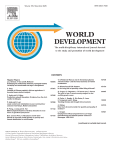
How robust are machine learning approaches for improving food security amid crises? Evidence from COVID-19 in Uganda
Cao, Gewei / Lukas Kornher / Clara BrandiExterne Publikationen (2025)
in: World Development 196, article 107171
DOI: https://doi.org/10.1016/j.worlddev.2025.107171
Open access
Amidst different global food insecurity challenges, like the COVID-19 pandemic and economic turmoil, this article investigates the potential of machine learning (ML) to enhance food insecurity forecasting. So far, only few existing studies have used pre-shock training data to predict food insecurity and if they did, they have neither done this at the household-level nor systematically tested the performance and robustness of ML algorithms during the shock phase. To address this research gap, we use pre-COVID trained models to predict household-level food insecurity during the COVID-19 pandemic in Uganda and propose a new approach to evaluate the performance and robustness of ML models. The objective of this study is therefore to find high-performance and robust ML algorithms during a shock period, which is both methodologically innovative and practically relevant for food insecurity research. First, we find that ML can work well in a shock context when only pre-shock food security data are available. We can identify 80% of food-insecure households during the COVID-19 pandemic based on pre-shock trained models at the cost of falsely classifying around 40% of food-secure households as food insecure. Second, we show that the extreme gradient boosting algorithm, trained by balanced weighting, works best in terms of prediction quality. We also identify the most important predictors and find that demographic and asset features play a crucial role in predicting food insecurity. Last but not least, we also make a contribution by showing how different ML models should be evaluated in terms of their area under curve (AUC) value, the ability of the model to correctly classify positive and negative cases, and in terms of the change in AUC in different situations.

